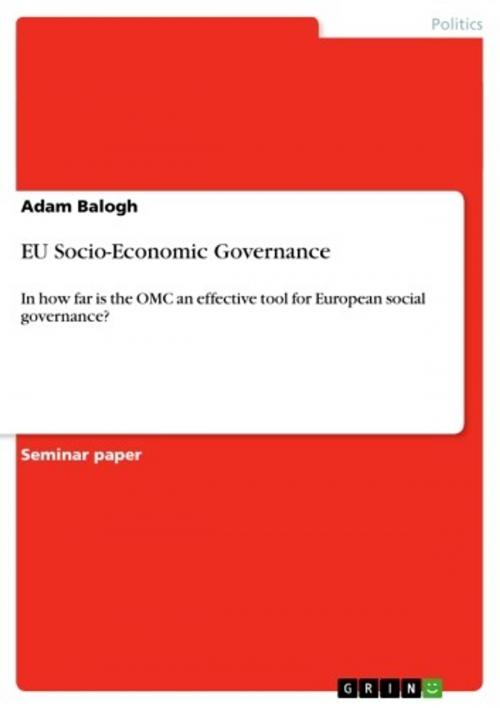EU Socio-Economic Governance
In how far is the OMC an effective tool for European social governance?
Nonfiction, Social & Cultural Studies, Political Science| Author: | Adam Balogh | ISBN: | 9783656371243 |
| Publisher: | GRIN Verlag | Publication: | February 12, 2013 |
| Imprint: | GRIN Verlag | Language: | English |
| Author: | Adam Balogh |
| ISBN: | 9783656371243 |
| Publisher: | GRIN Verlag |
| Publication: | February 12, 2013 |
| Imprint: | GRIN Verlag |
| Language: | English |
Seminar paper from the year 2013 in the subject Politics - International Politics - Topic: European Union, grade: A- bzw. 1,7, Central European University Budapest (Department of Public Policy), course: EU Socio-Economic Governance, language: English, abstract: In the mid-1990s, welfare states in Europe were under acute strain. Unemployment had risen dramatically (Trubek/Mosher 2001, 6) and in 1997, 18 per cent of the population of the European Union (EU) lived in a household below the relative income poverty threshold (Armstrong 2010, 1). Although social policies were traditionally tasks of the nation-states, an increasing 'Europeanization' of 'social exclusion' and the inability of the member states to act in an increasing multi-level governance context led to the need for actions on a European level (Armstrong 2010, 2). The start was made with the 'European Employment Strategy' (EES) (Trubek/Mosher 2001, 6), which became, due to its success, (Trubek/Trubek 2005, 349-351) the forerunner of the 'Open Method of Coordination' (OMC) (Sabel/Zeitlin 2008, 289). The OMC, like the EES, is an Instrument of governance in the EU, which is based on voluntary cooperation and rests on soft law mechanism (Borrás/Jacobsson 2004, 189). Armstrong describes the function of the OMC in his Book about European policy coordination as follows: 'The function of the OMC is not to make policy itself but rather to provide a framework within which states are encouraged to identify policy problems and to seek solutions either within their own domestic systems or by learning from the experience of others' (Armstrong 2010, 9). The reason for this soft law solution was the lack of political support for further transfers of legal competencies to the EU in social areas (Borrás/Jacobsson 2004, 190). But precisely because of this soft law nature, many critics accuse that the OMC is ineffective and even dangerous for further European integration (Trubek/Trubek 2005, 344, 351, 355).
Seminar paper from the year 2013 in the subject Politics - International Politics - Topic: European Union, grade: A- bzw. 1,7, Central European University Budapest (Department of Public Policy), course: EU Socio-Economic Governance, language: English, abstract: In the mid-1990s, welfare states in Europe were under acute strain. Unemployment had risen dramatically (Trubek/Mosher 2001, 6) and in 1997, 18 per cent of the population of the European Union (EU) lived in a household below the relative income poverty threshold (Armstrong 2010, 1). Although social policies were traditionally tasks of the nation-states, an increasing 'Europeanization' of 'social exclusion' and the inability of the member states to act in an increasing multi-level governance context led to the need for actions on a European level (Armstrong 2010, 2). The start was made with the 'European Employment Strategy' (EES) (Trubek/Mosher 2001, 6), which became, due to its success, (Trubek/Trubek 2005, 349-351) the forerunner of the 'Open Method of Coordination' (OMC) (Sabel/Zeitlin 2008, 289). The OMC, like the EES, is an Instrument of governance in the EU, which is based on voluntary cooperation and rests on soft law mechanism (Borrás/Jacobsson 2004, 189). Armstrong describes the function of the OMC in his Book about European policy coordination as follows: 'The function of the OMC is not to make policy itself but rather to provide a framework within which states are encouraged to identify policy problems and to seek solutions either within their own domestic systems or by learning from the experience of others' (Armstrong 2010, 9). The reason for this soft law solution was the lack of political support for further transfers of legal competencies to the EU in social areas (Borrás/Jacobsson 2004, 190). But precisely because of this soft law nature, many critics accuse that the OMC is ineffective and even dangerous for further European integration (Trubek/Trubek 2005, 344, 351, 355).















